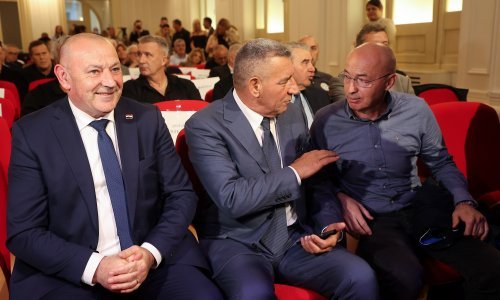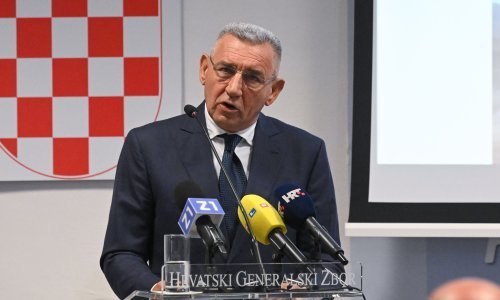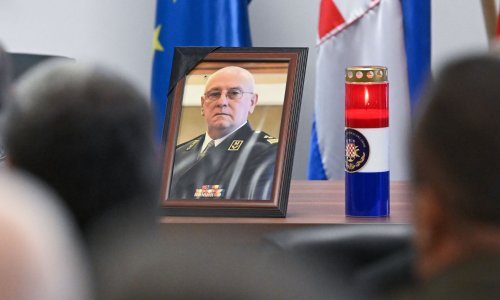The Trial Chamber of the International Criminal Tribunal for the former Yugoslavia (ICTY) erroneously concluded, based on its misinterpretation of a transcript of the Brijuni meeting as the only evidence, that before Operation Storm a joint criminal enterprise had been agreed with the aim of permanently removing the Serb population through the commission of crimes and that General Mladen Markac had participated in and made a significant contribution to such enterprise, the defence team representing the accused Croatian general said in their appeal brief, which the Hague-based tribunal made public on Wednesday.
On April 15, the Trial Chamber found General Markac and General Ante Gotovina guilty of war crimes committed against Serb civilians during and in the wake of Operation Storm in the summer of 1995 and sentenced them to 18 and 24 years in prison respectively.
More than half of Markac's 118-page brief was dedicated to the conclusions of the Trial Chamber relating to the existence of a joint criminal enterprise. His defence team said that the Trial Chamber committed errors in law and fact in analysing the Brijuni meeting of 31 July 1995 at which the Croatian military leadership, headed by President Franjo Tudjman, planned a combined military and police offensive, dubbed Operation Storm, to regain control of Serb-occupied areas of Croatia.
The brief analysed in detail key parts of the transcript of the Brijuni meeting, including a discussion on the opening of an evacuation route for Serb civilians at the start of Operation Storm, and explained the errors of the Trial Chamber in the interpretation of the transcript.
The defence said that the court had not heard a single witness who would have explained how far from other participants at the meeting Markac was or whether he was in the meeting room the whole time, including the moment when the sentences were said based on which the Trial Chamber made its conclusion about the existence of a joint criminal enterprise.
"If the whole case against the Appellant on JCE (joint criminal enterprise) hangs on whether he heard one word spoken or not - as to which there is no evidence - then that only illustrates how ludicrously thin the case against the Appellant is," the defence said.
The defence warned that Markac's remarks at the meeting were limited to operational issues, so there was no evidence that he had been aware of a criminal plan or that he had agreed with it. It said that the Chamber evidently considered that everyone who attended the Brijuni meeting "was, by virtue of that fact alone, a member of the JCE."
Markac's defence cited General Gotovina as saying at the meeting that a large number of civilians were already leaving Knin and that their number would decrease if Croatian forces continued the pressure. It said that the Trial Chamber misinterpreted Gotovina's statement as evidence of his involvement in the joint criminal enterprise instead of interpreting it in the context of Tudjman's sentence that preceded it, according to which the departure of civilians would result in the departure of enemy soldiers and would hence lead to a swifter military victory. The defence said that Gotovina's statement, made several days before the launch of Operation Storm, undermined the principle theory of the Trial Chamber about the large-scale persecution of civilians as a result of Croatian artillery attacks in the first days of Operation Storm.
The defence said that the Trial Chamber erred in law because it did not explore at all whether the Brijuni meeting could be explained in terms of a legitimate plan to recapture Croatian territory, which was then, allegedly, unlawfully executed. It said that the Chamber should have taken a stance on the legality of Operation Storm because it could have consequences for Croatia in terms of international law.
The defence also cited errors in the interpretation of the Brijuni meeting in light of subsequent events, saying that those "subsequent events", namely the shelling of civilians and prevention of their return, were never mentioned at the meeting.
The defence challenged the Chamber's conclusion about the commission of a crime of deportation as a crime against humanity and its conclusion that the armed conflict lasted throughout the time covered by the indictment. The defence said that the Chamber erroneously concluded that the crime of deportation was the result of artillery attacks on civilians, ignoring other reasons for departure, such as poor living conditions, increased tension in the area, anti-Croatian propaganda, people not wishing to live in Croatia, evacuation orders issued by the Serb leadership or plans by the Federal Republic of Yugoslavia (Serbia and Montenegro) to resettle Serbs to other areas of the former Yugoslavia. Here the defence cited newly-found evidence, including records of the Serbian Supreme Defence Council which showed that the cause of the massive departure of Serbs after Operation Storm was the decision by local Serb authorities.
The defence asked the Appeals Chamber to reverse the trial judgement or, alternatively, reduce "the manifestly excessive sentence" imposed on the appellant by the Trial Chamber.

































